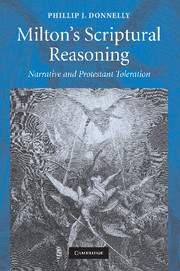Book contents
- Frontmatter
- Contents
- Preface and acknowledgments
- Abbreviations and editions
- 1 Introduction: Scriptural reasoning
- PART I SCRIPTURAL REASONING IN MILTON'S PROSE
- PART II BIBLICIST RHETORIC AND ONTOLOGY IN PARADISE LOST
- Part II introduction
- 4 Divine justice and divine filiation
- 5 Divine kingship
- 6 Rational battle
- 7 Rational allegory and gender
- PART III BIBLICIST POETICS AND HERMENEUTIC ETHICS
- Notes
- Subject index
- Index of Scripture references
7 - Rational allegory and gender
Published online by Cambridge University Press: 04 September 2009
- Frontmatter
- Contents
- Preface and acknowledgments
- Abbreviations and editions
- 1 Introduction: Scriptural reasoning
- PART I SCRIPTURAL REASONING IN MILTON'S PROSE
- PART II BIBLICIST RHETORIC AND ONTOLOGY IN PARADISE LOST
- Part II introduction
- 4 Divine justice and divine filiation
- 5 Divine kingship
- 6 Rational battle
- 7 Rational allegory and gender
- PART III BIBLICIST POETICS AND HERMENEUTIC ETHICS
- Notes
- Subject index
- Index of Scripture references
Summary
In choosing the human fall as the main narrative subject for Paradise Lost, Milton poetically engages a biblical story that had long been implicated in theological treatments of not only gender hierarchy but also rational faculty psychology and allegorical interpretation. In shifting the focus of this study from the central books of Paradise Lost to the climactic events of the Fall described in Book 9, this chapter moves our primary attention from the Son, as “Divine Reason,” to the human faculty of reason and its relation to gender difference. Nevertheless, in a manner similar to the depiction of the Son as the peaceful difference who is both from the Father and in the archē of all created being, Paradise Lost depicts the difference between male and female as one that is in the archē of human nature. The interpretive difficulty here is that modern readers of Paradise Lost will tend to assume that gender difference, like reason, is intrinsically coercive. In effect, readers who assume reason to be an imposition of order upon ontic chaos will similarly tend to assume that the archē in hierarchy and patriarchy is necessarily an imposition of will upon others, rather than a prior gift for the good of others that does not compel. In this sense, Milton proposes what I call an “ontic charity,” in which reality, rather being coercive or chaotic, is a gift whose purpose is the uncompelled good of others.
- Type
- Chapter
- Information
- Milton's Scriptural ReasoningNarrative and Protestant Toleration, pp. 142 - 166Publisher: Cambridge University PressPrint publication year: 2009

